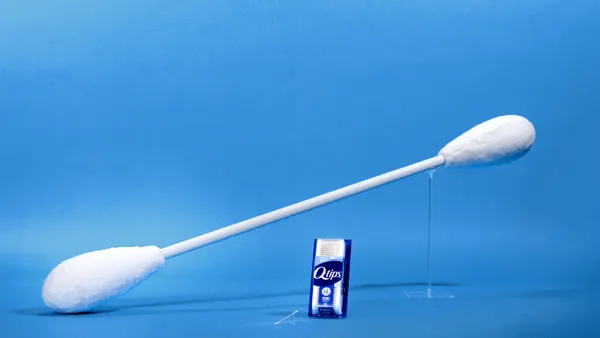Dive Brief:
- L Brands called off the Victoria's Secret Fashion Show — the lingerie and sleepwear brand's signature annual televised event — amid declining sales and TV ratings. The cancellation is part of an effort to "evolve the marketing of Victoria's Secret," L Brands CFO Stuart Burgdoerfer said in a quarterly conference call with analysts on Thursday.
- There are no plans to replace the event with anything of similar scale during the holiday season, Burgdoerfer said. The brand will continue to communicate with customers through social media, catalogs and other existing channels.
- Victoria's Secret's sales fell 7% in Q3 from a year earlier, a steeper drop than the 2% decline during the same period a year earlier. L Brands plans to close 56 Victoria's Secret stores and open seven new ones to end the year at 1,094 locations worldwide. The brand's same-store sales have declined every quarter since Q4 2016, except for a small increase in the first quarter of 2018, Fortune reported.
Dive Insight:
With no big televised event in Victoria's Secret's marketing mix, the brand is looking for how to make an emotional connection with consumers at a time when other lingerie brands are resonating through a mix of social media and streaming. Rihanna's Savage X Fenty brand streamed its New York Fashion Week show for Amazon Prime Video subscribers this year. The brand's sales are growing, in part because its inclusive positioning has helped it connect with younger consumers.
"We recognize and appreciate that the communication of the brand, the offerings, the emotional content of Victoria's Secret is obviously an important thing, and I expect that we'll have evolution of those things certainly as we move through the next six, 12 months," Burgdoerfer said on the conference call.
The cancellation of the fashion show is not exactly a surprise as it comes about six months after L Brands CEO Leslie Wexner announced in a memo to employees that the company was "rethinking" the annual event. He also said that network TV was no longer the "right fit" for the show, which ABC or CBS had broadcast for almost 20 years, CNBC reported. Last year's audience of 3.27 million viewers was the smallest since the fashion show had became a highly publicized TV event in 2001, while Nielsen said the show had lost more than half its audience in two years, the Associated Press reported.
The fashion show became a pop-culture phenomenon after it first appeared as a one-hour special that combined fashion, music and celebrities while serving as an extended infomercial for Victoria's Secret. However, the show's airing did not typically spur a jump in short-term sales, Burgdoerfer said.
The fashion show also was a source of much controversy, with some critics saying it objectified women. While the brand's declining sales pre-dated the expansion of the #MeToo movement into the mainstream two years ago, greater awareness of sexual misconduct against women changed the cultural conversation about what's acceptable in advertising. Brand inclusivity also became an issue for Victoria's Secret after former CMO Ed Razek made controversial remarks about excluding transgender and plus-size models from the show. Razek quit the company in August. On top of all that, CEO Wexner has faced scrutiny for his past ties to Jeffery Epstein, the convicted sex offender who died in jail while awaiting trial on sex-trafficking charges, CNBC reported. L Brands hired lawyers to review its relationship with Epstein in late July.












